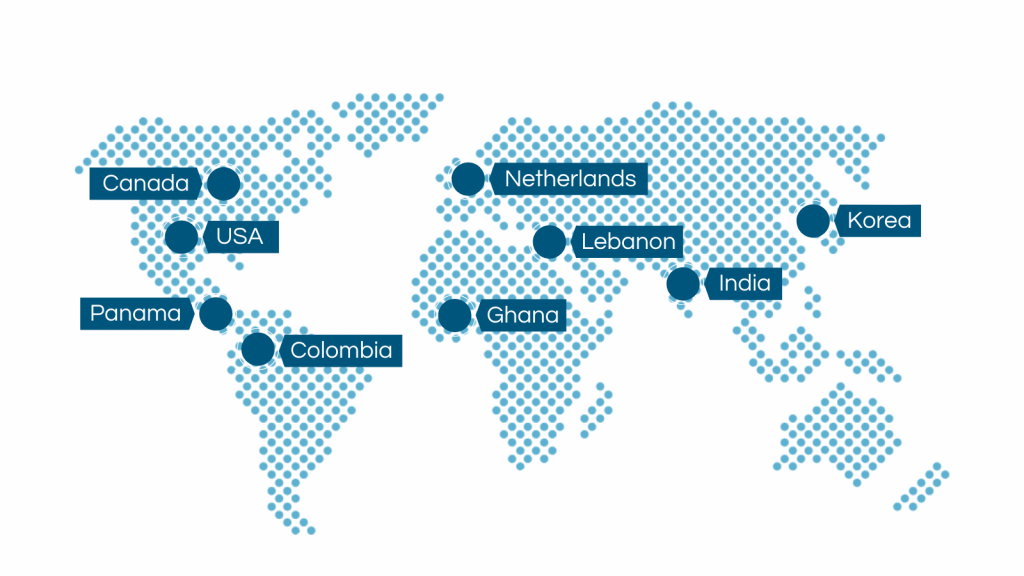E4C EDITORIAL TEAM: Grace Burleson, Engineering for Change; Mariela Machado, Engineering for Change
PROJECT ADVISORS: Caroline Soyars, E4C Steering Committee Member & University of Michigan; Robert Hauck, ASME EGD Committee; Eddine Sarroukh, Philips Foundation & UN SDGPP, Christine Reilley, ASME
Click here to view the full report
In 2020 the engineering community responded to the urgent need for medical equipment to combat the novel coronavirus (COVID-19) pandemic. Demand for personal protective equipment (PPE) skyrocketed as healthcare providers rushed to the front lines and governments began mandating the use of face coverings in public spaces. Furthermore, ventilators, essential medical devices for treating patients with severe COVID-19 symptoms, were in shortage around the world. Symptom tracking and contact tracing technologies were developed to prevent the spread of the virus. This report highlights just a few of the global engineering community’s collective efforts to combat the pandemic and improve safety and well-being of healthcare workers and the public.
The interviews and desk research provides insights on the importance of collaboration with organizations or companies where factors like accelerated government support, revamped funding mechanisms, training, and dedicated task force helped in delivering the solutions. While there have been hundreds of projects, initiatives, and dedicated teams working towards technological solutions to combat the pandemic, this report highlights just a few in Canada, Colombia, Ghana, India, Lebanon, the Netherlands, Panama, South Korea, and the USA.
In Canada, The Canadian Shield partnered with several companies to produce face shields for hospitals through the support of the federal and provincial governments in Canada. Over 300 design iterations were made to meet the end user needs and to adapt to mass production needs.
In Colombia, InnspiraMED was established with the support of hundreds of volunteers from academia, business, and the public sector to meet the demands due to the spread of the virus. Since March 2020, InnspiraMED has executed a variety of initiatives including mass testing for early detection of COVID-19, developed data collection tools to service public health, and designed open-source ventilators and respirators.
In Ghana, a robust engineering workforce mobilized to respond to technology shortages, such as PPE, testing equipment, and ventilators. Partnerships between the Ghana Society of Biomedical Engineers, makerspaces, and universities assembled teams to design and manufacture necessary technologies, such as 3D printed face shields. Through government support, and resources from the Ghanaian garment industry, roughly 15 million face masks have been manufactured and distributed to healthcare facilities and schools.
In India, contact tracing app Aarogya Setu was developed to track the spread of COVID-19. However, the technology has received criticism from experts regarding its security and potential benefits. The government of India did initiate a number of programs to raise awareness about the app and once made it compulsory for the officials to have the app installed but later reinstated the order. The app reached the masses but the measure on the effectiveness is still a point of discussion. Furthermore, in India, a robotics company, Nocca Robotics, has pivoted their business to develop ventilator designs. As of July 2020, the company has a facility with the capacity to manufacture 40 ventilators per day, and has ventilators distributed to eight hospitals in India.
In Lebanon, hundreds of volunteers joined the newly-established Lebanon Response Teams, with the mission to support the needs of the national healthcare system. During the height of the pandemic, the team manufactured and donated 2500 face shields to the government and hospitals, distributed intubation boxes to 24 hospitals, and donated thermometers to a few organizations.
In the Netherlands, Project Inspiration reverse-engineered a ventilator design from the 1960’s at Delft University of Technology. The goal of the project was to design and implement ventilators in Low- and Middle-Income Countries through partnerships with health ministries, healthcare workers, and manufacturing and distribution entities. Project Inspiration’s ventilator design has been used in collaboration with Respira Guatemala to manufacture and distribute technology in Guatemala.
In Panama, a team of students and faculty at the Technological University of Panama worked together to design a high flow humidifier. Initiated by the Ministry of Health in Panama, the design team has developed a design that costs only 210 USD and can be manufactured in Panama.
In South Korea, more than 120 companies, universities, and government bodies participated in a contact tracing program to cater to the challenging task of acquiring and processing user data. The funding support from the ministry of land, infrastructure, and transport and the Korean CDC helped to build the contact tracing platforms. The development of smart city databases to monitor traffic, environment, housing, and facilities across cities in Korea made it possible for companies like N2M and Dtonic to develop contact tracing datahub.
In the USA, General Electric and Ford Motor Company partnered to produce and distribute more than 50,000 ventilators in 5 months of time. Engineers with expertise in automotive assembly lines designed and implemented a safe and efficient ventilator assembly program. Engineers with medical device experience rapidly completed over 200 design changes from an original ventilator design with goals to achieve rapid manufacturing, device usability in wide-ranging environments, and quick troubleshooting on the assembly line.
Click here to view the full report
This research was completed as part of the 2020 E4C Fellowship program. Learn more about the Fellows who worked on this research collaboration by connecting with them on LinkedIn: Nishant Agarwal, Marie Floryan, Jang Hyeon Lyu, Helen Lindsay, and Carolina Rojas.


No Comments.